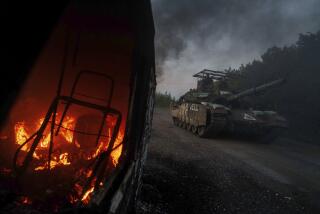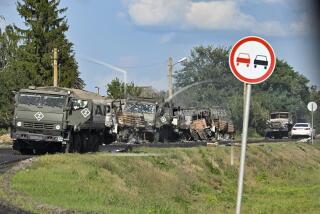Russia Force Enters Gorge in Georgia
- Share via
MOSCOW — Russia sent a contingent of heavily armed troops deep into a contested gorge in the former Soviet republic of Georgia on Friday in an operation that threatened to escalate the conflict just as U.S. military personnel are moving into the region.
The operation was quickly condemned by Georgian officials and U.N. observers. The Georgian military was placed on high alert, and commanders were authorized to use live fire in the event of a confrontation.
“A decision has been made to open fire in case of any uncoordinated actions” by the Russians, Georgian Defense Minister David Tevzadze said. “This decision has already been forwarded to commanders on site.”
Russian officials said they sent 78 peacekeepers into the upper part of the Kodori Gorge to reestablish a checkpoint dismantled during an upsurge in violence last autumn. They said the operation was authorized under an agreement signed with Georgia last week renewing the mandate of peacekeepers to patrol Abkhazia, a separatist region in western Georgia.
Abkhazia, a former resort area on the Black Sea coast, has operated as a de facto independent republic since it fought a war for independence that ended in 1994.
Since then, a force of almost 2,000 Russian peacekeepers has been stationed there, and 109 U.N. observers have kept an eye on the tense border zones. Georgia has repeatedly accused the Russian peacekeepers of aiding and abetting the Abkhazian rebels.
The Kodori Gorge is in a contested area between the two sides. It is ethnically Abkhazian and is traditionally considered part of Abkhazia, but officially it is in the Georgian zone of control. As part of the agreement last week, Georgian troops withdrew from the area to permit U.N.-monitored peacekeepers to patrol.
The peacekeepers are formally under the aegis of the Commonwealth of Independent States, a political grouping of former Soviet republics. But in practice, they are mostly from Russia and are commanded by Russian officers.
“It is our duty to monitor and control the withdrawal of regular military units of both sides from the Kodori Gorge, as well as to patrol the entire area of the Kodori Gorge on a regular basis in compliance with the Tbilisi protocol of April 2, 2002,” said Igor Konashenkov, spokesman for the CIS peacekeepers. “This is the mission that we have arrived here on.”
But Georgian and U.N. officials said the operation violated last week’s agreement. Pakistani Maj. Gen. Anis A. Bajwa, the head of the U.N. observer mission, said he had warned the Russian peacekeepers of that in advance.
“It is to my total surprise, therefore, that the CIS [peacekeeping force] decided to undertake the establishment of this checkpoint immediately in an aggressive and combative manner, which is against the norms of peacekeeping,” the general said in a statement. “I strongly urge the leadership of the CIS to immediately withdraw and act only in a manner mutually agreed and acceptable to all parties.”
Television footage of the peacekeepers showed them wearing robin’s-egg-blue helmets. Under U.N. regulations, the CIS peacekeepers are not supposed to wear U.N.-style blue helmets because they are not official U.N. peacekeepers.
The United States is preparing to deploy military trainers in the region to help Georgia better control two lawless mountainous areas: the Kodori Gorge and the Pankisi Gorge, which borders the separatist Russian region of Chechnya. The Americans were originally scheduled to arrive last month, but preparations are still under way and no official arrival date has been set.
Russia has complained vociferously that Georgia has failed to control the Kodori Gorge. After a group of Chechen fighters allegedly took refuge there last year, warplanes and helicopters bombed several villages. Georgia accused Russia of bombing its territory; Russia denied the charge.
In a sign of alarm over the new escalation in tension, Georgian President Eduard A. Shevardnadze flew to the gorge Friday to negotiate with the Russian commander; he returned to Tbilisi, the Georgian capital, in the evening, saying he had received a pledge that they would withdraw.
“I have issued an ultimatum--the contingent deployed in [Kodori] should be withdrawn,” Shevardnadze said. “It is clear that it is impossible to do it at nighttime. But they have got all day tomorrow at their disposal.”
However, Russian news agencies reported late Friday that the Russian Defense Ministry refused to confirm that such a pledge had been made.
“These issues will now be solved at a higher level,” said Maj. Gen. Alexander Yevteyev, commander of the Russian peacekeepers.
*
Times staff writer William Orme at the United Nations contributed to this report.
More to Read
Sign up for Essential California
The most important California stories and recommendations in your inbox every morning.
You may occasionally receive promotional content from the Los Angeles Times.










